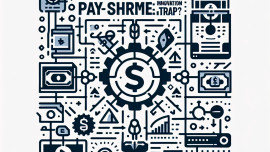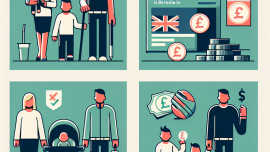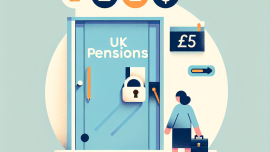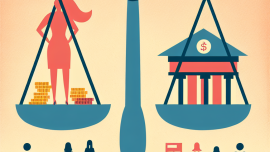
How Minor Changes in Interest Rates Hit the Most Vulnerable First
Why Financial Literacy Should Be a Civil Right
Imagine navigating a complex maze blindfolded. Now replace that maze with your financial life—bank accounts, credit scores, retirement plans, loans, taxes—and there’s no manual. Welcome to modern adulthood. For millions of Americans, understanding money isn’t an option, it’s a survival skill. So why isn’t financial literacy treated like the civil right it truly is?
Hi there, I’m Eleanor “Ellie” Cartwright. I call things as they are—with a touch of sass and a lot of passion. I’ve spent years battling bureaucratic nonsense and advocating for the everyday consumer. And let me tell you: we are failing our citizens by not giving them the financial tools to thrive. So grab a cup of coffee and get cozy—because it’s time we talk about your financial rights, and why financial literacy should be one of them.
The Cost of Ignorance: It’s Not Just About Dollars and Cents
First things first: financial ignorance isn’t cute. It’s expensive—and not just for the individual. Lack of knowledge about basic financial concepts ripples through communities, families, and economies. Poor financial decisions lead to:
- High levels of consumer debt
- Skyrocketing default rates on student loans and credit cards
- Underfunded retirements
- Predatory lending traps (hello payday loans!)
According to the FINRA Investor Education Foundation, nearly two-thirds of Americans can’t pass a basic financial literacy test. That should scare you. We test kids on algebra they’ll never use, but never teach them how compound interest actually works? That’s malpractice, my friends.
What Exactly Is Financial Literacy?
Financial literacy is knowing how to earn, save, invest, and spend your money wisely. It’s also about understanding consumer rights, the fine print in financial contracts, navigating credit, avoiding fraud, and making informed economic choices throughout life.
Being financially literate doesn’t mean you need to decode Wall Street memos. It means you don’t get blindsided by a variable mortgage rate or overpay your taxes because no one taught you about deductions. It’s empowerment. It’s defense. It’s justice.
The Link Between Financial Literacy and Civil Rights
If you’re shaking your head thinking, “Well, that’s not a civil rights issue,” let me break it down for you.
Civil rights are fundamentally about providing equal opportunities to life, liberty, and pursuit of happiness—regardless of race, gender, class, or background. Yet, access to financial education is drastically unequal. Here’s how it plays out:
- Minority and low-income schools often lack formal financial education programs.
- First-generation college students are more likely to take on crippling student loans without fully understanding the implications.
- Immigrant families may struggle navigating U.S. banking systems and credit structures.
- Predatory lending disproportionately targets marginalized communities.
No financial literacy = no economic mobility. And economic mobility is a cornerstone of civil liberty. So yes, financial literacy IS a civil rights issue—because without money knowledge, you’re denied the basic tools to improve your life.
Who’s Responsible for Fixing This?
1. Public Schools
Financial education needs to start in elementary school and evolve as kids grow. Imagine if personal finance was treated with the same importance as math and science? Currently, only 23 states in the U.S. require high school students to take a personal finance course (according to the Council for Economic Education). That’s not enough, America. Do better.
2. Government & Lawmakers
Policymakers need to champion legislation making financial education mandatory. Period. Furthermore, existing federal programs (like HUD counseling or FAFSA resources) should be expanded, modernized, and marketed better. Let’s also not forget regulatory protection against predatory practices—because education and enforcement go hand in hand.
3. Financial Institutions
Big banks owe us more than overdraft fees and clever commercials. They should actively provide community workshops, bilingual financial education tools, and simple, transparent practices that treat every consumer with dignity. Don’t just say you believe in “empowerment.” Prove it with action.
4. Employers
Yep, your job has a role too. From retirement plan orientation to financial wellness programs, employers can become strong allies in creating financially literate workforces. After all, a stressed employee is a distracted employee.
What You Can Do Right Now
Tired of waiting for the system to change? Me too. So let’s start local. Here are a few steps you can take today:
- Push for financial education in your school district. Join a PTA meeting and demand curriculum reform.
- Vote with your wallet. Support institutions that prioritize consumer education and ethical practices.
- Educate yourself. That includes trusted books, nonprofit resources, and yes, even YouTube (but vet your sources!).
- Talk about money. Normalize money discussions with your family, friends, and coworkers. Shame fuels ignorance.
- Be loud. Contact your state representatives and demand legislation that protects and empowers consumers financially.
The Bottom Line: It’s Time to Wage a Financial Rebellion
I’ve said it once and I’ll shout it again: financial literacy should be treated as a basic civil right. Not a luxury. Not a privilege. A right.
We can’t allow a lack of knowledge to become a systemic barrier to equality. This is about justice. It’s about providing every person with the tools to not just survive—but to thrive. Whether you’re a single mom juggling two jobs, a college student taking out loans, or a retiree managing your savings, you deserve to understand the financial systems shaping your life.
And if the system won’t serve us equitably, we’ll build one that will. Together.
Let’s turn education into emancipation. Because when people are financially literate, they’re not just informed…they’re unstoppable. And that’s the kind of power we all deserve.
Want to join the movement or just talk money matters with someone who gets it? Visit our About Us page to learn more about what we stand for—or contact us anytime. We’re listening.









Leave a Reply